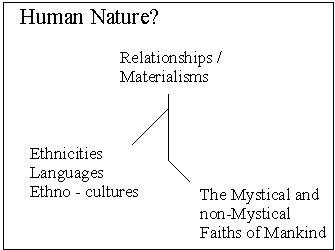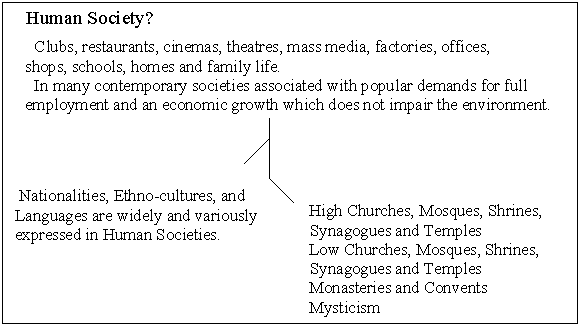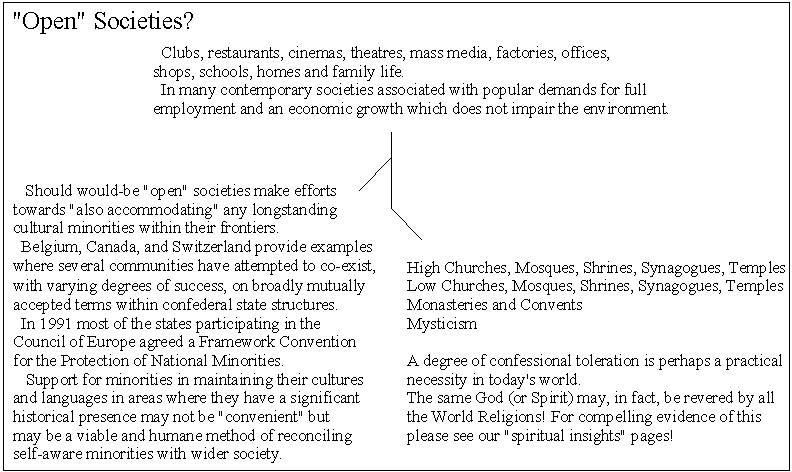Welcome
whose flower and fruitage is the world..."
From this page it is hoped to demonstrate that it may well be that behavioural "roots" ~ innate to Humanity ~ greatly tend to give rise to Human Societies!!!

Human Nature?

Human Society?
Or to quote Emerson more fully:-

In order to more fully explore the notion that the Human World? bursts forth as "flower and fruitage" from human-innate "roots" it is necessary to venture a little into some interesting philosophical areas:-
(Plato - The Republic : Book 4)
Plato lived in Athens and was a contemporary of Socrates and of Aristotle both of whom he knew personally.
He is recognized as being one of the most enduringly influential figures in the history of western philosophy. A well regarded twentieth century philosopher even went so far as to suggest that -
(A.N. Whitehead ~ in his work Process and Reality)
Plato's most famous work is his "The Republic". It features two highly relevant passages explicitly suggesting that human actions fall into three categories - and that human beings have a "Tripartite Soul".
Similar suggestions are to be found in other of Plato's works.

At age-of-the-sage we have explored such ideas fairly extensively and have to admit that our
own researches do lead us to the conclusion that human nature is
basically "tripartite" along the lines suggested by Plato's insightful questions about our actions and our faculties.
Although the range of ideas that directly arise from a consideration of Emerson's quote about Man as being a "knot of roots" and Plato's
questions about the human "motivational" soul tend to be somewhat psychological we are confident that on fuller consideration
these ideas will be seen as having immense potential towards leading to a greater philosophical understanding
of the human condition.
Thoroughly convincing answers to questionings about "what people innately
are" and about
"what people are innately motivated to do" are important
forms of wisdom we should all be interested in attaining as they have the potential help us to
better understand our own lives, our own societies, and the world we live in.
We are seeking to bring the results of our researches into such deep
questions about human existence to public attention and,
in order to do so, have decided to present what we hope you will consider to be
convincing evidence in support of this tripartite view of human existence.

Our site is rather large and to facilitate a structured introduction to our findings we recommend three routes:-
The Tripartite Soul
This is a review of how (significantly) Pythagoras, Plato, Socrates, Shakespeare, Emerson and (very significantly) such major World Religions as Christianity, Islam, Hinduism and Buddhism all hold the view that Human Spirituality is relative to "Desire" and to "Wrath" thus supporting the three-directioned representation of Human Nature and the suggested relationship between "Human Nature and Society" that are presented earlier on this page.
The Study of History
R. G. Collingwood
It may well be that one of the most unappreciated things that people do in history is to contribute to what might be called "the Construction of Social Reality":-

We all in our every day lives quietly contribute to the construction of a Social Reality. This process may be of paradigm philosophical significance looked at from the point of view of "what man has done" being a lesson in "what man is!!!"
It can be suggested that what people are moved to do, because people are so prompted by human-innate drives, gives rise to many socially structured practices including the "Human-material" world of homes, schools, shops, places of work, and transportation systems.
Spiritual capacities (again probably innate to human beings) are usually expressed within one of several world religions hence churches, mosques, shrines, synagogues and temples.
Ethnic group forming capacities (again probably innate to human beings) are usually expressed through national or tribal cultures.
The consideration of ethnicity and how it is expressed in the wider world leads on toward a consideration of politics and historical developments. The example of an "Open Society?" as presented above is perhaps a somewhat contemporary and liberal "Social Construct". We have, however, prepared a brief series of pages about the notably turbulent European Revolutions of 1848 in the hope that their content will demonstrate something of what the human "bundle of relations and knot of roots - has done" in an unsettled time in history and thus hopefully facilitate the cultivation of greater levels of insight into what that "knot of roots" actually is and into what that "knot of roots" tends to give rise to in terms of historical and social developments.
Although 1848 was quite a long time ago (by human standards) we hope to demonstrate that a study of this situation where "modern" liberalist, constitutionalist, nationalist and socialist aspirations were widely seeking to challenge historically long established traditions of "throne and altar" governance can yield many important insights into The Human Condition.
Please bear in mind that our history pages actually continue to examine later periods of western european history but that we consider that these few pages about the Revolution of 1848 are sufficient to establish the principle that the "human knot of roots" has a telling influence on historical developments.

Comparative Religion
Charles Darwin, in his Autobiography written late in life, mentions something of his own early religious convictions, (he actually trained as an Anglican priest just prior to voyaging on the Beagle). Towards the end of this Autobiography there is an extensive sub-section actually entitled "Religious Beliefs" that contains these passages:-…This argument would be a valid one, if all men of all races had the same inward conviction of the existence of one God; but we know this is very far from being the case. Therefore I cannot see that such inward convictions and feelings are of any weight as evidence of what really exists…"
In our own times sympathetic translations of the religious texts of many World Faiths have been made available such that western peoples can hope to better appreciate the Wisdoms respected by faiths and cultures across the world.
The philosopher Leibniz is credited with coining the phrase "The Perennial Philosophy" in relation to what he perceived to be a shared respect by several World Religions for such spiritual virtues as "Charity", "Purity of Heart", and "Humility".
Our own studies in this area have led us to recognise that the list of spiritual virtues respected by ALL the major World Religions can be very greatly extended - even to the point of effectively overturning Darwin's reservations as set out in his Autobiography.
